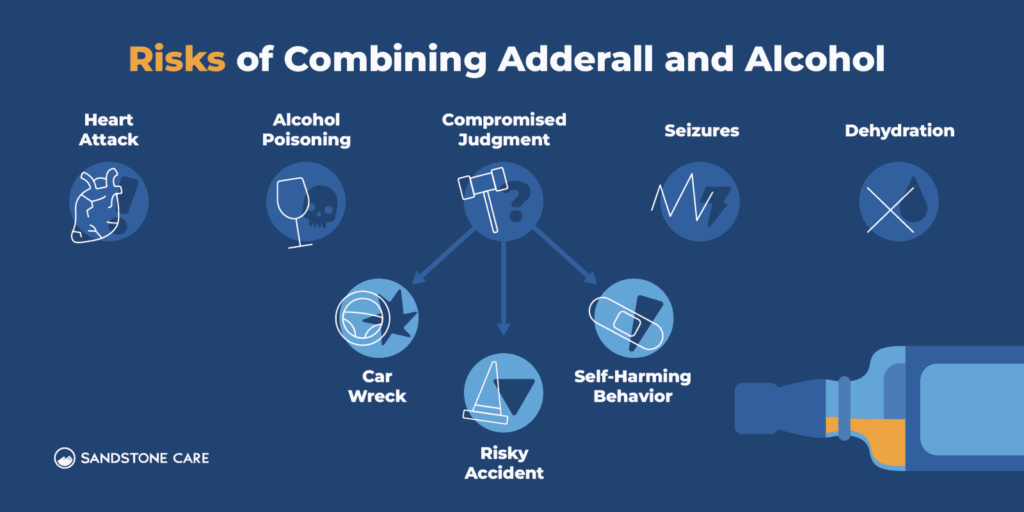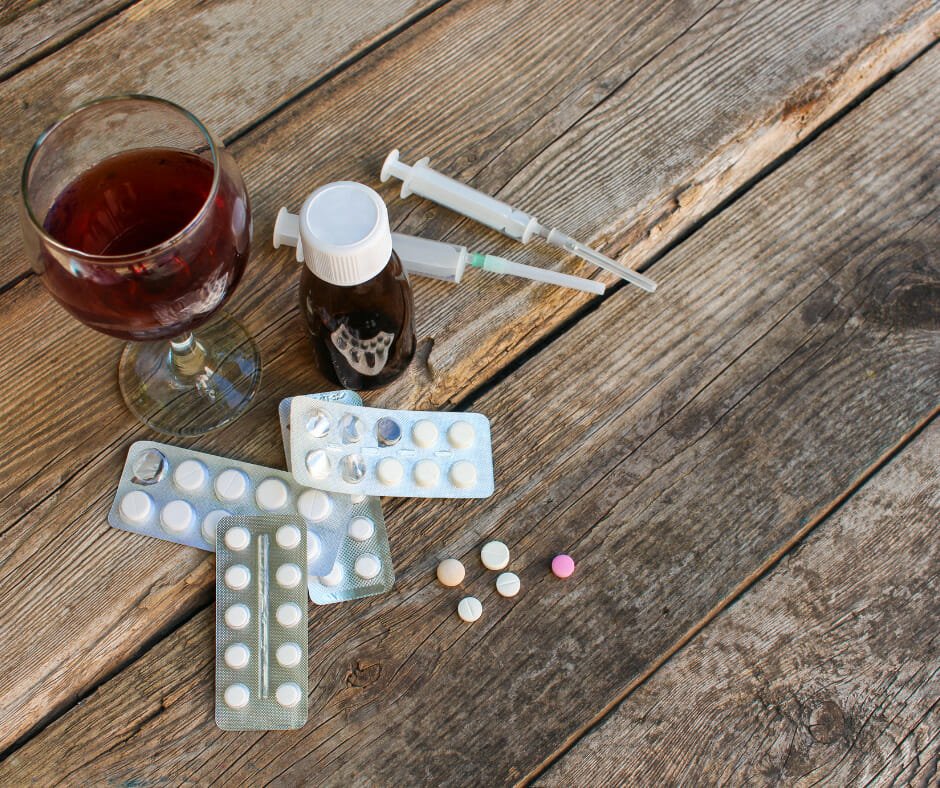Adderall and alcohol are two widely used substances, but combining them can lead to dangerous and potentially life-threatening effects. Adderall is a prescription medication primarily used to treat attention-deficit hyperactivity disorder (ADHD) and narcolepsy. It works as a stimulant, enhancing focus and energy levels. Alcohol, on the other hand, is a central nervous system depressant that slows brain activity and impairs coordination, judgment, and reaction time. Mixing these two substances can create serious health risks, as their effects can counteract or amplify one another in harmful ways.
What Is Adderall?
Adderall is a combination of amphetamine salts designed to improve focus and reduce impulsivity in individuals with ADHD. It is classified as a Schedule II controlled substance due to its high potential for abuse and addiction. When taken as prescribed, Adderall can be a highly effective treatment. However, when misused—such as taking higher doses, snorting, or combining it with other substances—it can lead to dangerous outcomes.
How Alcohol Affects the Body
Alcohol is a legal substance consumed by millions of people worldwide. It acts as a depressant, which means it slows down vital functions like heart rate, breathing, and brain activity. Even moderate drinking can impair cognitive and physical abilities, while excessive alcohol consumption can lead to alcohol poisoning, blackouts, and long-term liver damage.

What Happens When You Mix Adderall and Alcohol?
The combination of Adderall and alcohol is particularly concerning because of their opposing effects on the central nervous system. Adderall’s stimulant properties can mask the sedative effects of alcohol, making it harder for individuals to gauge their level of intoxication. This can lead to excessive drinking, increasing the risk of alcohol poisoning and related complications.
1. Masked Intoxication
When taking Adderall, users may feel more alert and less impaired than they actually are. This can lead to:
- Drinking more alcohol than intended.
- Engaging in risky behaviors such as drunk driving or unsafe sexual activity.
- Increased likelihood of alcohol poisoning, as the body’s natural warning signs (e.g., drowsiness, loss of coordination) are suppressed.
2. Increased Risk of Cardiovascular Issues
Both Adderall and alcohol can strain the heart in different ways. Adderall raises heart rate and blood pressure, while alcohol can cause irregular heart rhythms. Combining the two can:
- Exacerbate hypertension (high blood pressure).
- Increase the risk of heart attack or stroke.
- Lead to arrhythmias (irregular heartbeat), which can be life-threatening.
3. Heightened Mental Health Risks
Mixing Adderall and alcohol can negatively affect mental health, especially for individuals already prone to anxiety, depression, or other psychological conditions. Potential effects include:
- Heightened anxiety or panic attacks.
- Increased risk of aggression or erratic behavior.
- Exacerbation of symptoms in individuals with bipolar disorder or other psychiatric conditions.
4. Increased Risk of Addiction
Combining substances often increases the likelihood of developing a dependency on one or both. Adderall misuse is associated with a high risk of addiction due to its stimulating effects, which can lead to a cycle of abuse when combined with alcohol.

Why Do People Mix Adderall and Alcohol?
Despite the risks, some individuals deliberately mix Adderall and alcohol for various reasons, including:
To Enhance Social Experiences
Many people use Adderall to stay alert and energized while drinking at parties or social events. They believe it allows them to drink more without feeling the sedative effects of alcohol.
To Counteract Alcohol’s Depressive Effects
Adderall’s stimulant properties can make users feel more awake and less sluggish, counteracting the drowsiness often caused by alcohol.
As a Coping Mechanism
Some individuals may misuse both substances as a way to cope with stress, anxiety, or other emotional challenges, without recognizing the long-term harm they’re causing to their bodies and minds.
Short-Term Effects of Mixing Adderall and Alcohol
The immediate effects of combining Adderall and alcohol can include:
- Nausea and vomiting.
- Increased heart rate and blood pressure.
- Impaired coordination and judgment.
- Heightened risk of accidents or injuries.
- Blackouts or memory lapses.
Long-Term Consequences of Mixing Adderall and Alcohol
The chronic use of both substances together can lead to severe health issues, including:
1. Neurological Damage
Both Adderall and alcohol can have long-term effects on brain health. Chronic misuse can lead to:
- Cognitive impairments such as memory loss and reduced problem-solving abilities.
- An increased risk of developing mental health disorders like depression or anxiety.
- Structural changes in the brain that affect decision-making and impulse control.
2. Liver Damage
Alcohol is processed by the liver, and excessive consumption can lead to liver disease. Mixing it with Adderall, which also places stress on the liver, can accelerate liver damage.
3. Addiction and Dependency
Chronic misuse of Adderall and alcohol increases the likelihood of addiction. The body may come to rely on these substances to function, leading to a dangerous cycle of dependency.
Recognizing the Signs of Abuse
It’s important to recognize the warning signs of Adderall and alcohol misuse, which can include:
- Increased tolerance (needing more of the substance to achieve the same effects).
- Withdrawal symptoms such as irritability, fatigue, or depression when not using the substances.
- Neglecting responsibilities at work, school, or home due to substance use.
- Risky behaviors like driving under the influence or mixing other substances.

How to Seek Help
If you or someone you know is struggling with Adderall and alcohol misuse, seeking professional help is crucial. Resources include:
- Medical Detox Programs: To safely manage withdrawal symptoms under medical supervision.
- Therapy and Counseling: Cognitive-behavioral therapy (CBT) and other approaches can address underlying issues and develop healthier coping mechanisms.
- Support Groups: Organizations like Alcoholics Anonymous (AA) and SMART Recovery provide peer support for those recovering from substance abuse.
- Rehabilitation Programs: Inpatient or outpatient programs offer comprehensive treatment plans tailored to individual needs.
Preventing Misuse
To avoid the risks associated with Adderall and alcohol, consider these prevention strategies:
- Follow Prescriptions Carefully: Always take Adderall exactly as prescribed by your healthcare provider.
- Educate Yourself: Understand the risks of combining substances and share this knowledge with others.
- Practice Moderation: If you choose to drink alcohol, do so in moderation and avoid using other substances simultaneously.
- Seek Healthy Coping Mechanisms: Exercise, mindfulness, and therapy can be effective ways to manage stress and anxiety.
Conclusion
Mixing Adderall and alcohol is a dangerous practice that can have severe short- and long-term health consequences. While some individuals may perceive temporary benefits, the risks far outweigh any perceived advantages. From cardiovascular complications to mental health challenges and addiction, the combination poses significant dangers to physical and emotional well-being.
Understanding the risks and recognizing the signs of misuse are crucial steps in preventing harm. If you or a loved one is struggling with substance abuse, don’t hesitate to seek professional help. With the right support, recovery is possible, and a healthier, more balanced life can be achieved.
1. Can you drink alcohol while taking Adderall?
Mixing alcohol with Adderall is generally not recommended. Adderall is a stimulant, and alcohol is a depressant. When combined, they can mask each other’s effects, leading to overconsumption of alcohol, increased risk of alcohol poisoning, or strain on the heart.
2. What happens if you mix Adderall and alcohol?
Combining Adderall and alcohol can lead to:
Increased heart strain: Both substances can elevate heart rate and blood pressure.
Impaired judgment: Adderall can mask the sedative effects of alcohol, leading to overdrinking.
Higher risk of side effects: Such as anxiety, dehydration, dizziness, and nausea.
Potential for addiction: The mix may increase the potential for misuse of either substance.
3. How long should you wait to drink alcohol after taking Adderall?
The waiting period depends on the type of Adderall:
Immediate-release Adderall: Effects typically last 4-6 hours; alcohol is safer to consume after this time.
Extended-release (XR): Effects can last up to 12 hours, so it’s best to wait at least that long.
Always consult your doctor for personalized advice.
4. Why do some people use Adderall and alcohol together?
Some individuals combine Adderall and alcohol to:
Counteract alcohol’s sedative effects and stay alert.
Enhance social confidence.
However, this practice is risky due to the health implications and potential for misuse.
